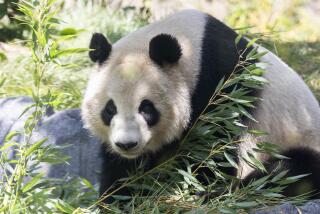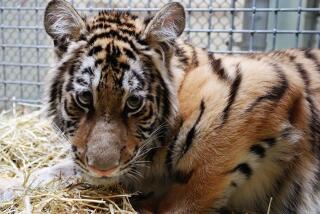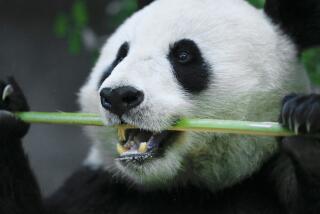Newborn giant panda cub dies suddenly at National Zoo
A giant panda cub born days ago at the National Zoo in Washington died Sunday, as the zoo’s frustration with breeding giant pandas continues.
Zoo staff heard the cub’s mother, Mei Xiang, make a “distress vocalization” and tried to resuscitate the cub using CPR, to no avail, officials said.
The nameless cub — whose sex still wasn’t known by zookeepers — weighed less than 100 grams and did not appear to have suffered any trauma or infection, the zoo said.
It was a tough loss for zoo officials, some of whom were emotional at a Sunday news conference. Only 1,600 giant pandas remain in the wild and a little more than 300 live in captivity. Reproduction is a challenge; female giant pandas are only fertile once a year and usually produce only one viable cub.
Even when the cub is born healthy -- about the size of a stick of butter -- it can die unexpectedly. On occasion, it can be accidentally crushed by the massive mother.
Mei Xiang and Tian Tian, the cub’s father via artificial insemination, are on loan to the National Zoo from China, and the couple has only produced one living cub, Tai Shan, in 2005. All offspring are required to be returned to China when they are old enough.
Officials have previously said that if Tian Tian’s sperm failed to get Mei Xiang pregnant, the zoo would seek pandas more likely to produce offspring.
“This year was really a make-or-break year in terms of getting Mei Xiang pregnant,” Brandie Smith, the zoo’s giant-panda curator, told the Washington Post on Saturday, before the cub died.
Mei Xiang’s pregnancy this year came as a bit of a surprise, given the low success rate for pandas who haven’t reproduced for several years.
The Washingtonian reported that a necropsy was scheduled for Sunday and a report would be available in two weeks.
More to Read
Sign up for Essential California
The most important California stories and recommendations in your inbox every morning.
You may occasionally receive promotional content from the Los Angeles Times.











